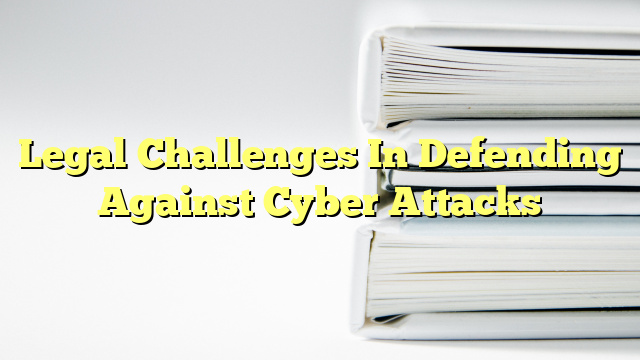Legal Issues in Cybersecurity
There are a number of legal issues that can impact the ability of organizations to effectively defend against cyber attacks. Most importantly, the law of each jurisdiction can vary significantly when it comes to cyber security. Different countries have different laws governing cyber security, and different laws within each jurisdiction can also apply. For example, in the United States, the Computer Fraud and Abuse Act of 1986 (CFAA) is the main legislation governing cyber security, while in the UK, the Computer Misuse Act 1990 is the primary legislation.
In addition to the differences between jurisdictions, there is also a lack of consistent guidance on how organizations should respond to cyber attacks. This can lead to confusion when organizations are trying to determine the best course of action. In some cases, organizations may be unsure if they are legally allowed to take certain actions in order to protect themselves against attacks. This can create difficulties in effectively countering threats.
Another issue that can arise is the difficulty in attributing cyber attacks to specific individuals or entities. This is due to the fact that many attacks are carried out by anonymous actors, making it difficult to identify and prosecute the perpetrators. This can make it difficult for organizations to take legal action against those responsible for attacks.
Why It Is Difficult to Defend Against Cyber Attacks
Defending against cyber attacks can be complicated due to a number of factors. First, attackers often use sophisticated methods that are difficult to detect and defend against. This can include using tools such as malware and other malicious software, or using techniques such as phishing and social engineering. Attackers can also use encryption to hide their activities, making them difficult to identify and counter.
Another factor that makes defending against cyber attacks difficult is that attackers often target multiple victims at once. This means that a single attack can cause significant damage to many different systems, making it difficult to respond to a single incident. Additionally, attackers can launch simultaneous attacks against different systems, making it difficult to defend against them all.
Finally, attackers can continue to adapt and evolve their methods quickly, meaning that countermeasures that have been effective in the past may no longer be effective against new attacks. This means that organizations must continually update their defenses in order to remain protected.
Methods of Defense Against Cyber Attacks
Organizations can use a variety of methods to defend against cyber attacks. These include both proactive measures, such as monitoring systems for suspicious activity, and reactive measures, such as responding quickly to incidents and taking steps to repair any damage caused.
Proactive measures include using security software such as firewalls, antivirus programs, and intrusion detection systems to monitor for malicious activity. Organizations can also implement regular security audits and vulnerability assessments to identify and address any potential weaknesses in their systems. Additionally, organizations can use encryption and other methods to protect their data.
Reactive measures include responding quickly to incidents and taking steps to repair any damage caused. Organizations should have a response plan in place that outlines the steps to be taken in the event of a cyber attack. This includes steps such as notifying law enforcement and other relevant authorities, taking steps to limit the damage, and evaluating the potential impact of the attack.
Organizations can also use defensive measures such as segmenting their networks and implementing access control measures to limit the damage an attacker can cause. Additionally, organizations can implement training and awareness programs to help employees recognize and report suspicious activity.
How the Government Defends Against Cyber Attacks
The government plays a key role in defending against cyber attacks. Governments can use various legislative and regulatory measures to combat cyber crime, as well as providing guidance and support to organizations on how to protect against cyber threats. Governments can also invest in research and development of new technologies in order to improve the ability of organizations to detect and respond to cyber attacks.


It is crucial to understand the legal implications of defending against cyber attacks in order to protect against them.
Great tips! More education/awareness on these issues is key.